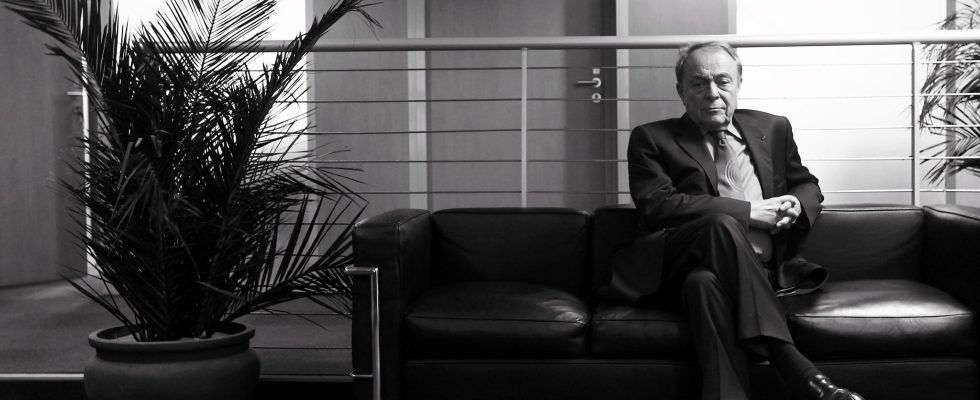Politics likes nothing more than to make its dead speak. What would de Gaulle have said? What about Mitterrand then? Ah Chirac, it was something else! Since the arrival of Emmanuel Macron in power, Michel Rocard has rarely been invoked so much. He was not president, just prime minister. But his name reappears as soon as a government uses and abuses article 49, paragraph 3, of the Constitution.
Understand, he was the champion of this constitutional weapon, and yet he was on the left! This was the key argument of Elisabeth Borne, her distant successor who forgot the popularity of this same Rocard, despite the excessive use of 49.3. He will leave Matignon with a 50% favorable opinion, an exception in the choir – provided – of the Prime Ministers of the Fifth Republic.
The journalist and political scientist Jean-Michel Djian has not forgotten all this, nor all the other secrets of Rocard, who died in 2016, which he reveals in the fascinating book Rocard, the disenchanted enchanter (Le Cherche-Midi, 2023), written using unpublished archives to which he had access thanks to Sylvie Rocard, the last wife. A man with a grandiloquent CV (deputy, senator, minister of state, minister, MEP, etc.) at the forefront of his political time and judge of ours, so impetuous. “Casing nothing, he is throwing our desperate cowardice back in the face,” writes the author who leafed through Michel Rocard’s latest notebooks, these notebooks in which this fighter for peace wrote his love of the present time but also his concerns.
Macron rather than Valls
Because Rocard was a man full of anguish, and in particular about this eternal opposition between right and left which he feared would undermine French democracy. “France has suffered a lot from the fanatical brutality with which right and left opposition is implemented here. In all the others, we clash while knowing how to work together […]. With us the cross-border handshake was a fault […]. The political talents of one half of France have never contributed to enriching the work of the other, only to diminish and weaken it”, he wrote to Nicolas Sarkozy in February 2012, when the duel between this This is probably why the Social Democrat bet on Emmanuel Macron, from 2014, rather than his “protégé”, a certain Manuel Valls.
Rocard is also the one who claimed to be the man of “truthful speaking” (the name of his book, written with Jacques Julliard in 1979), of the death of small sentences, of these punchlines that harm, but that had a price. All these notes, Rocard did not prevent himself from recording them in a few letters to those who today exercise this strange profession that is politics, “this profession of the savage”, he said. Advice on good conduct, in short, sent to François Hollande as to Emmanuel Macron, or even before them to the one who stole the show from him in the post-Mitterrand era: Lionel Jospin.
“I am a candidate…”
Djian recounts, relying on two letters, that Rocard made two offers of services to Jospin. A first time in 1997 when the government of the plural left simmers in the scullery, under the aegis of the “grand curly”. Rocard fears that history will be made without him. Injustice. On June 9 of that year, he wrote a few words to Jospin, “in rapid urgency”: “I understand very well, and better than that, I approve and I would do the same, that you do not open with anyone no discussion about the composition of the government. There is hardly a more hellish task than that. But it may be useful for you to know the wishes and then you will do what you can. I am a candidate for the post of Minister of Foreign Affairs.” Five years later, in 2002, when the whole left was convinced that Jospin would succeed Chirac, he recalled fondly his comrade’s memory: “When you are president, you will need a foreign policy that is otherwise inventive. I am still there.” He will never receive an answer, ever.
A beloved email. A too sincere Protestant. The most popular of prime ministers will remain this “misunderstood”, this “misunderstood”, lonely within the socialist house, dismissed by Mitterrand and his successors. In July 2014, when Emmanuel Macron broke through and François Hollande’s five-year term was already crumbling, he wrote a will, soberly titled “I’ll go to sleep in Corsica” where he made a declaration of love for the island and indicates that he wishes to be buried there.
“Visiting cemeteries is a ritual that is slowly falling into disuse. It displays archaism, bordering on the ridiculous […]. Today we rather visit the deceased more intermittently, in search of a memory or a meeting of ideas.” This is why Jean-Michel Djian narrates these ultimate secrets, recorded in the old notebooks of the former minister, with a hint of Rocardian nostalgia: Ah, what if it had been him?
